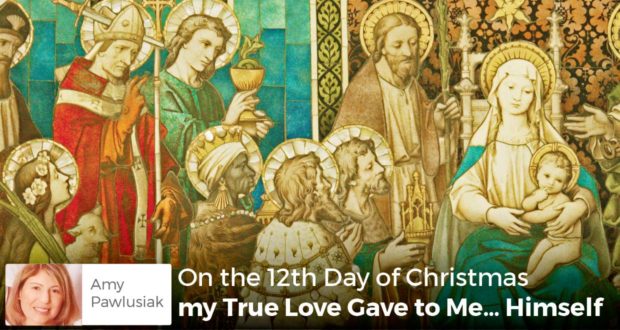Summary
In a world that celebrates the materialistic, Amy Pawlusiak offers why the Church, in her wisdom, gives us twelve days to keep Christmas alive in our homes.The day after Christmas is a bit gloomy.
I drive down the street in my subdivision and see myriads of thrown-off Christmas trees lying on driveways, ready to be picked up by the garbage collectors. Many people are already taking down their festive Christmas lights.
The songs on the radio, having blasted Christmas music since the day after Thanksgiving, suddenly remember there are other songs to play, and revert back to their regular genres.
The world has moved on, and with Christmas day over, is now enticing me with new items to make the upcoming holiday festive.
New Year’s party favors line the shelves, and I know it won’t be long until Valentine day cards follow. The world has moved on, but I haven’t. I still know there are twelve days of Christmas coming until Epiphany.
The hard part is figuring out how to continue celebrating in a world that no longer celebrates the Christ child, and his amazing birth, but has replaced it with a materialistic idea of Christmas that ignores Him completely.
It’s all Emotion and Stuff
The world sells emotion, between the Hallmark channel movies, the syrupy Christmas carols about “coming home for Christmas” and the idea that Christmas is all about family and presents.
Although it’s great to have family get together for Christmas, I know that the reason we get together is not about us. As most things in life, the best celebrations are about someone else.
We celebrate events like a marriage, a birthday, or a sacrament. We don’t celebrate us, we celebrate them, and in the meantime, family comes together and gets to focus on the amazing things God is doing in someone’s life.
But because the world wants to forget Jesus, they instead focus on what they can sell, which is the “The Perfect Christmas.” And despite our best efforts, we’ve all bought into the idea that we need an amazing tree, flawless decorations, scrumptious food, and impeccably wrapped gifts for it to be a “Great Christmas.”
And no matter how many years we see ourselves stress out in order to make this holiday fairy tale come true, we know that by the time we actually get to Christmas, we are left feeling stressed, tired, and worn-out.
The day’s greetings may even seem hollow because we are more thankful that we’ve made it to the finish line than to Christmas.
We Need 12 Days
In God’s great wisdom, He knew our humanity would need more time to take it all in. We would need 12 days to celebrate. Not just a day, or a week, or even 10 days, but 12. Twelve is God’s number. It is used 187 times in the Bible. He gave us 12 tribes of Israel and 12 apostles. For him, it’s the number of perfection.
So, because Jesus is perfect, he gave us 12 days to think about how perfect His coming is. It really is astounding that God would send his only son to us as a baby, to join us in our broken humanity.
We can’t comprehend this great truth. It makes no sense, but then again, as St. Paul said, “God uses the foolish to confound the wise.”
So we stumble into the 12 days tired, exhausted, and needing to grasp the meaning of Christmas. And as I drive through the streets, stop at the store, or go wherever I need to go, I can’t help but feel alone in my endeavor to keep Christmas another 12 days.
Keeping Christmas
I know I need help, so I ask my friends to tell me how they keep the twelve days of Christmas alive in their homes. I get many responses from good Catholic friends who give me great ideas. Some give 12 gifts on the 12 days of Christmas.
Others move their wise men a bit closer each day to their nativity set, in preparation for Epiphany. One friend puts a white candle in the middle of her advent wreath and changes the Christmas songs from waiting songs (like “Oh Come Emmanuel”) to songs celebrating his arrival (like “Joy to the World”).
Finally, on Epiphany, we bless our homes with blessed chalk and write “20 +C+M+B+17” above our thresholds. The letters C, M, and B have two meanings. They are the initials of the traditional names of the three magi: Caspar, Melchior, and Balthazar.
They also abbreviate the Latin words Christus mansionem benedicat, “May Christ bless the house.” The “+” signs represent the cross and 2017 is the year. I love all of these ideas!
I’ve decided I want to use them in my own home this coming year. But it isn’t until I have a late night conversation with a good friend who has known me for years that I’m able to put it all into perspective.
The Church Lights the Way
When I asked my friend this question, he didn’t mention the outward signs as most others had. Instead he pointed to the church. “Look at the feast days! We have the feast of St. Stephen, our first martyr on the 26th. The Feast of the Holy Innocents on the 28th, and we celebrate the Holy Family on the 30th. When we go to church on January 1st, it’s not for the New Year, it’s for the Solemnity of Mary, Mother of God! Finally, we celebrate Epiphany on January 6th!”
When I think about all these feast days, I realize that I don’t have to just “do more,” I need to unite with the church more. We need to look at what God did through St. Stephen and all his saints; we need to remember the Holy Innocents, and all who have innocently died for the Faith.
We need to look to Mary, our consummate mother, and remember her divine motherhood to Jesus. Finally, when we reflect all that the church is showing us through these feasts, we then look at how God has revealed himself to Man through his son on Epiphany (which means “to reveal” in Greek).
Outward Signs Still Matter
Our favorite saying in my homeschool group is to keep everything “Simple and Saintly.”
In this vein, for most busy families, in order to keep the 12 days of Christmas, we may want to try to do the things my friends mentioned above. Move those wise men! Keep up your Christmas lights and tree! Celebrate each day with a small gift or treat.
And finally, bless your house on Epiphany. When we do these things they remind us that we are part of His church, and that though the world has moved on, we are still celebrating with awe and wonder what God gave us on Christmas… hope through his Son!
Like lights along a pathway into a home, the church shows us how to celebrate Christmas. First by remembering that Christ came to our broken earth as a baby, then through the selfless examples of the saints and holy innocents, and finally through the love of His mother.
Only after we have walked the pathway of these days can we have the epiphany of being one day welcomed into God’s Heavenly home.

 Seton Magazine Catholic Homeschool Articles, Advice & Resources
Seton Magazine Catholic Homeschool Articles, Advice & Resources

